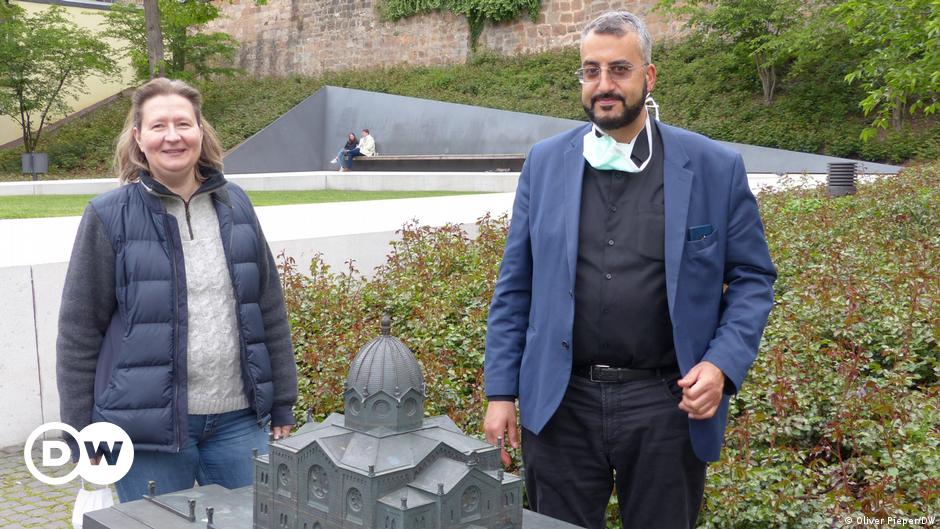
It’s not every day that members of the Jewish and Muslim communities come together. But even more notable is the association that Monika Bunk and Bilal El-Zayat founded one year ago, called “Together: Marburg Society for Jewish-Muslim Dialogue” (“Gemeinsam e.V. Marburger Gemeinschaft für Jüdisch-Muslimischen Dialog”).
“We won’t bring the Middle East conflict to Marburg, where we can’t solve it,” the two activists say as they make their appeal to some 100 participants of a vigil for peace in Israel and the Palestinian territories.They make sure that placards and slogans don’t go too far. Bunk explains “you can criticize Israel’s policies all you want, but you can’t deny its existence or recognition.”
Some 100 participants held a vigil in Marburg for peace in Israel and the Palestinian territories
Their initiative in Marburg is an example of how it’s possible to overcome divisions: Bunk is Jewish, a theologian; El-Zayat is Muslim, a surgeon. They’ve known each other for 20 years, and they’ve both received a German integration prize for their activism.
The current Middle East conflict is putting the two communities’ trust to the test. Marburg’s Islamic community includes around 5,000 people, and some of its members are Palestinians from the Gaza strip. Emotions are running high. El-Zayat tells of one member whose uncle lost his house due to the recent airstrikes.
Seven years ago, during the 2014 Gaza War, Bunk and El-Zayat were asked to take on roles as crisis managers and mediators to prevent the Middle East conflict from leading to a confrontation in Marburg.
Freedom of speech and its limits
Trust has grown over time in the Jewish-Muslim association, and members make sure religion and politics are strictly divided. Despite differences of opinion, there is a common cause: The desire to live together peacefully in Marburg — even if sparks can fly during political discussions.
80,000 people live in the picturesque university town of Marburg
“It’s not all sunshine and roses. Sometimes things really heat up here,” El-Zayat says. “But we’ve learned over the years to have more understanding for the opposing side.” Bunk steps in to correct. “Although really there is no opposing side because there are no opponents here.”
Bunk recalls the quarrel she and El-Zayat had overthe publication of cartoons in western media poking fun at the prophet Muhammad. They were miles apart from each other when it came to the question of how far freedom of speech could go.
In today’s times, when social media adds fuel to the fires of interreligious conflict, the association’s founders try to solve things by talking.
Jews and Muslims: More similarities than differences
First and foremost comes the organization’s motto: Jews and Muslims have more things in common than divide them.
In 2019, when they heard of people falling victim to antisemitic attacks simply because they were wearing a yarmulke,Bunk and El-Zayat were immediately reminded of Muslim women, who often face hostilities because they wear a headscarf. The pair quickly organized a “Yarmulke-Headscarf Day” in Marburg.
Both of them recall the successful joint protests by Jews and Muslims in 2012 for legislation on the circumcision of young males. They also highlight the religions’ similar burial rituals.
Bunk and El-Zayat addressed the crowd at the vigil for peace in Israel and the Palestinian territories
Last September, some 20 members of Marburg’s 320-person Jewish community attended the inauguration ceremonies for the city’s new mosque.
When Bunk and El-Zayat organized a tour bus to visit the Buchenwald concentration camp, Jews, Christians, and Muslims took part.
In the future, the group has planned chess tournaments and cooking courses as ways for people to get to know each other better, because food always brings people together.
“We’ve certainly made a difference, but I don’t know if in our lifetimes we’ll experience coexistence between Jews and Muslims being the most normal thing in the world,” Bunk says, thinking about the future. Still, she often gets approached by young Muslims on the street who tell her that she and El-Zayat are role models.
El-Zayat adds, “We Muslims in Germany have to recognize that a partnership with Jews in this country can help us. And it’s exactly the same the other way around.”
This article has been translated from German.






